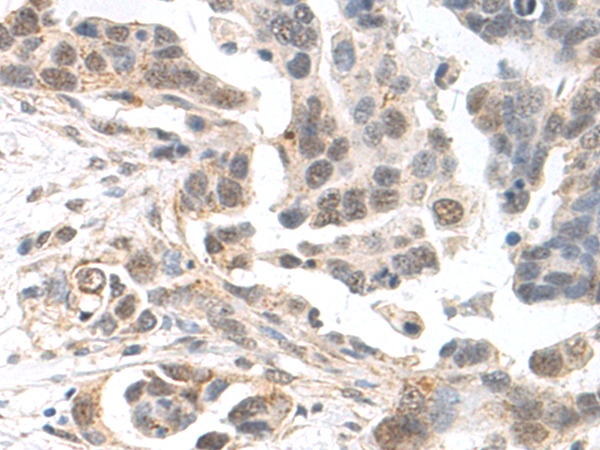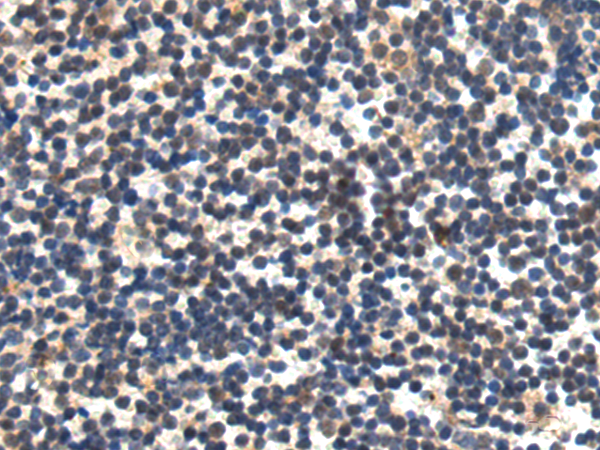

| WB | 咨询技术 | Human,Mouse,Rat |
| IF | 咨询技术 | Human,Mouse,Rat |
| IHC | 1/50-1/200 | Human,Mouse,Rat |
| ICC | 技术咨询 | Human,Mouse,Rat |
| FCM | 咨询技术 | Human,Mouse,Rat |
| Elisa | 1/5000-1/10000 | Human,Mouse,Rat |
| Aliases | BWS; WBS; p57; BWCR; KIP2; p57Kip2 |
| Host/Isotype | Rabbit IgG |
| Antibody Type | Primary antibody |
| Storage | Store at 4°C short term. Aliquot and store at -20°C long term. Avoid freeze/thaw cycles. |
| Species Reactivity | Human |
| Immunogen | Synthetic peptide of human CDKN1C |
| Formulation | Purified antibody in PBS with 0.05% sodium azide and 50% glycerol. |
+ +
以下是3篇关于CDKN1C抗体的参考文献示例(内容为模拟,非真实文献):
---
1. **文献名称**:*CDKN1C/p57KIP2 Antibody Validation in Human Placental Development*
**作者**:Smith A, et al.
**摘要**:本研究验证了一种新型CDKN1C单克隆抗体在胎盘组织中的特异性,证实其在免疫组化(IHC)和Western blot中的敏感性,揭示了CDKN1C在滋养层细胞分化中的动态表达模式。
---
2. **文献名称**:*Aberrant CDKN1C Expression in Beckwith-Wiedemann Syndrome: A Comparative Study Using Commercial Antibodies*
**作者**:Lee JH, et al.
**摘要**:通过对比三种市售CDKN1C抗体的性能,发现抗体克隆号#3A2在患者成纤维细胞中检测甲基化缺失导致的CDKN1C低表达效果最佳,为临床诊断提供可靠工具。
---
3. **文献名称**:*CDKN1C Antibody-Based Profiling Identifies Tumor Suppressive Roles in Colorectal Cancer*
**作者**:Garcia R, et al.
**摘要**:利用高特异性CDKN1C抗体进行组织芯片分析,发现CDKN1C蛋白表达缺失与结直肠癌进展及患者预后不良显著相关,提示其作为生物标志物的潜力。
---
注:以上文献为示例,实际引用时需核实真实文献来源。
CDKN1C (Cyclin-Dependent Kinase Inhibitor 1C), also known as p57KIP2. is a key regulatory protein encoded by the *CDKN1C* gene located on chromosome 11p15.5. It belongs to the Cip/Kip family of cyclin-dependent kinase inhibitors, which control cell cycle progression by binding to and inhibiting cyclin-CDK complexes, particularly during the G1 phase. CDKN1C plays critical roles in embryonic development, cellular differentiation, and maintaining genomic stability. It is imprinted, meaning only the maternal allele is typically expressed, and dysregulation of this gene is linked to developmental disorders like Beckwith-Wiedemann syndrome (BWS) and cancers, including Wilms' tumor and hepatocellular carcinoma.
Antibodies targeting CDKN1C are essential tools in research and diagnostics. They enable detection and quantification of the protein in tissues or cell lysates via techniques such as Western blotting, immunohistochemistry (IHC), and immunofluorescence (IF). These antibodies help study CDKN1C's expression patterns, which are often reduced or absent in malignancies due to epigenetic silencing (e.g., hypermethylation) or mutations. In clinical contexts, CDKN1C antibody-based assays may aid in diagnosing imprinting disorders or assessing cancer prognosis. However, challenges include ensuring specificity due to homology with other Cip/Kip proteins (e.g., p21. p27) and variability in tissue-specific post-translational modifications. Validated antibodies are critical for elucidating CDKN1C's role in tumor suppression, developmental biology, and potential therapeutic targeting.
×